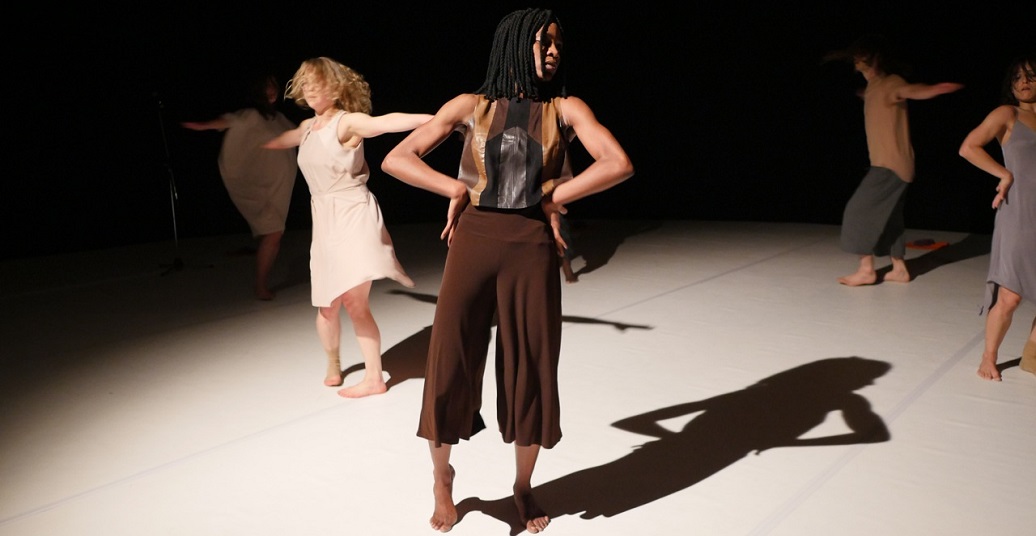Dialogues around race and racism are necessarily fraught with tensions. “Unrestricted Contact” raises many difficult questions, including: ‘How do we escape the white imagination?’ – this work from Grupo Oito and choreographer Ricardo de Paula has some suggestions.
We sit on the outer edges of a circular performance space, backs to the wall. Between us, seven performers tread slowly around a large ring of light, eyes downcast, following the feet of the person in front. Together, we form a trio of concentric circles; audience, dancers, light. The dancers begin to run in loops, and the no-man’s land separating them seems to grow brighter, more unavoidable. Eventually, they break out of the vortex, and their focus turns towards the centre. Dashing in and out of the spotlight, the dancers form duos and trios, leaping high, slicing the air, testing themselves and each other. The middle ground becomes a gladiatorial pit; a place for thrashing out differences.
Two microphones stand at opposing edges of the space, facing each other. The performers occasionally leave the maelstrom of movement at the centre of the stage to speak. Each starts with a simple ‘hi’ or ‘hello’, but soon, they go deeper, and issues of race and identity are thrown across the arena. The stakes are raised significantly. “I could tell you many things you can’t do when you’re black. But I won’t,” says Nasheeka Nedsreal.
The atmosphere is tense, almost dangerously charged. It is as though this is the first time these things are being spoken out loud. “Do you see me as white?” asks one performer over the pounding music. Nedsreal steps up to the microphone opposite, gazing through the whirling, stamping bodies. She moves her mouth closer to the microphone. Just as she is about to speak, she pauses, then smiles and turns away. It is a chillingly effective moment. Her silence speaks volumes.
The tensions of the outside world are transposed unapologetically into “Unrestricted Contact”. This is no simplistic statement along the lines of ‘deep down, we’re all the same’. Differences are emphasised and exposed, with each dancer using their own, unique movement language, and drawing on their personal experience as they speak. Using their heterogeneity as a starting point, they prise open a space to have these difficult conversations.
To the sound of Janelle Monae’s 2015 protest song Hell You Talmbout, the ensemble repeats a phrase in unison, over and over again. The song’s lyrics loudly proclaim the names of African Americans who have died as a result of racial violence, including police brutality, and urges us to say their names continually. Every so often, a dancer leaves the group, and stalks around the audience, fists held defiantly above their head. As their eyes meet mine, I am dragged into the action, denied the comfortable illusion of a neutral onlooker. Pushing themselves to the point of exhaustion, the dancers become ever more ragged and heavy-limbed, and we bear witness to their effort and their fatigue. Momentary catharsis seems possible, but there are no painless solutions offered here.
As we leave, we pass under the UV lights that have been switched on at the entrance. Our tickets, teeth, and shoelaces glow, quite literally highlighting whiteness. In another context, this might seem too obvious a gimmick – especially in the more cynical, ironic corners of the Berlin dance scene – but “Unrestricted Contact” appears more concerned with getting up close to its subject matter and its audience than remaining stylistically aloof. Grupo Oito certainly have powerful voices of their own, but they also leave space for ours, and they exhort us to fill it.




